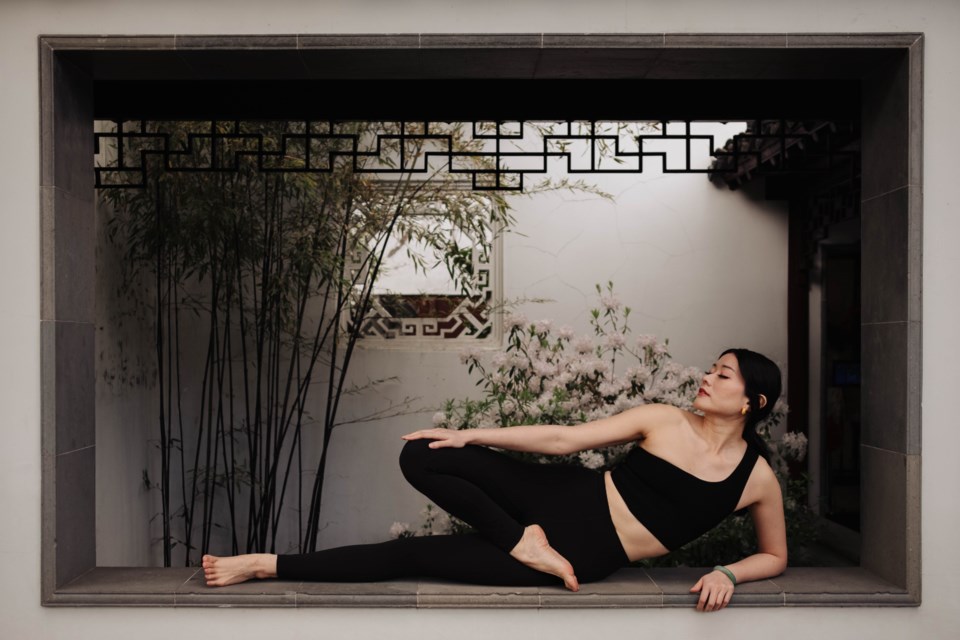Vancouver's Asian community has endured decades of trauma. The B.C. metropolis was named the Anti-Asian Hate Crime Capital of North America, and the city's Chinatown continues to be the target of racist attacks.
Anti-Asian hate crimes remain an issue within the city, with a staggering spike seen during the pandemic.
But how does the deep trauma that results from racist violence and discrimination show itself in the body?
According to Irene Lo, this type of trauma looks different for everyone.
Trauma in the body
Lo is a virtual yoga instructor and tarot card reader for women of colour and allies. As a mystic and movement guide, she helps her students heal deep-rooted traumas and practice radical rest, creating safe spaces for BIPOC communities to look inwards to heal racial traumas.
"Trauma impacts how our bodies self-regulate on a psychological as well as a somatic level. So really, the question is how settled is our nervous system?" Lo says.
She explains that individuals with an unsettled nervous system interpret their surroundings differently than those in a neutral space. "A neutral face can be angry or cold to us when we are living in our trauma," she says.
As a result, individuals living through trauma don't always know how to show up, reacting with behaviours that fall into fight, flight, freeze or fawn responses.
According to Lo, trauma can make individuals lean on such responses to help them live with and through the trauma, numb the feelings and dissociate from reality — which may not be the healthiest coping method.
Trauma-informed spaces
Though yoga can help traumatized individuals work through complicated feelings and challenges, not all wellness spaces offer the same support.
"A trauma-informed yoga space can really help students empower themselves on their own healing journey, which happens when a yoga space can hold space for students to be with their body so that they can listen to their body, trust their intuitive wisdom, and the teacher is with them."
Though a trauma-informed wellness space like Lo's is ideal, finding one can prove more challenging than expected.
Issues within yoga
"[People] might think that just because [they're] going to a space that is all about wellness that that place is going to be trauma-informed. Unfortunately, many wellness spaces and many teachers are not trauma-informed," shares Lo.
The challenge with finding a trauma-informed space ties into other issues that Lo has noticed while on her yoga journey.
"I didn't really notice how much I had subscribed to white supremacy, patriarchy, colonial and capitalist values in my life until I saw it in the yoga world. I didn't notice that on a conscious level, but subconsciously, it was there," she explains.
It wasn't until Lo began to teach yoga classes and work with her mentor on decolonizing yoga that she noticed and observed the colonial and racist issues within yoga. "When it comes to racial trauma, a lot of me staying small was because I had subscribed to that model minority myth, which was racial trauma. That was an unhealthy, addictive coping strategy that I was not comfortable [and] not happy to do anymore. It was through yoga that I was able to make changes in my life [and] I was able to show up as myself and be happy for it."
Lo's healing journey through yoga began with her first yoga asana class in high school. Lo was hooked after taking her first hot yoga class, and despite the many issues surrounding hot yoga, according to Lo, she was able to connect with herself.
This connection is what Lo aims to help her students achieve.
"A trauma-informed space celebrates the choices of students to listen to their body because not all bodies are the same," says Lo. "And so depending on where we are on that day, our bodies need to express ourselves in a different way, whether that's through a different movement or taking rest. Giving [students] this permission allows us to begin to reconnect to our body, which we've become so disconnected [from]."
Creating space in Vancouver
Though Vancouver has a multicultural population, the city's Asian communities have endured generations of racial traumas. Lo realizes the importance of carving out space for BIPOC communities.
"Vancouver is a city that is known for being a yoga city, but everyone here who has positions of power is white. And [those who] are people of colour often have to play roles of being a token, which is what happens unless we make our own spaces."
Though she prefers to teach her classes online, Lo sees the need for physical connection. Her Candlelit Yin Yoga event at the Dr. Sun Yat-Sen Classical Chinese Garden on May 10 brought together Asian women and non-binary individuals to practice yoga asana and radical rest.
"It was a healing space where everyone shared their stories," she shares of the event. "I could tell how that space is needed just for us from the shares of people feeling having all of these experiences that were similar but different and feeling the affirm that they weren't the only ones going through it."
"We think that yoga is just [performing] these movements and then [leaving], but it's really about community. Yoga is about healing and community."
In-person yoga events are a foreseeable future for Lo, in addition to her online classes.
"There needs to be more BIPOC spaces. There needs to be more of that here in the city, more uplifting of our stories, amplifying our voices and supporting of our work and really seeing us right, not just propping us up as a token, and truly engaging with what we are saying," Lo says.
Lo's classes help heal from racial traumas, but with each class and safe space she creates, Lo helps carve space for Asian and BIPOC voices to come through.




